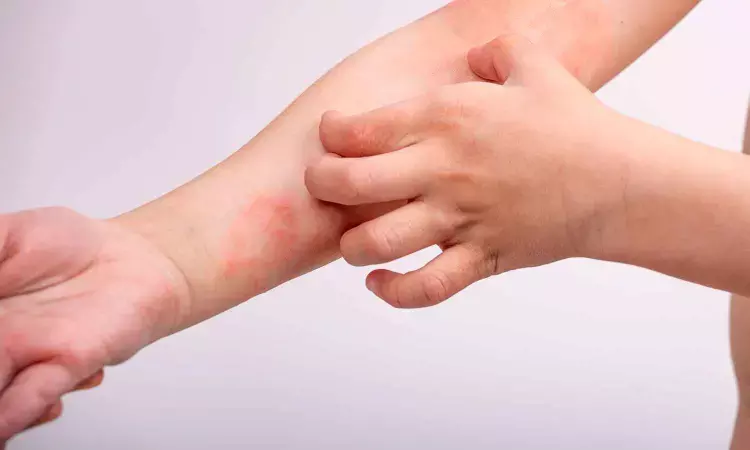- Home
- Medical news & Guidelines
- Anesthesiology
- Cardiology and CTVS
- Critical Care
- Dentistry
- Dermatology
- Diabetes and Endocrinology
- ENT
- Gastroenterology
- Medicine
- Nephrology
- Neurology
- Obstretics-Gynaecology
- Oncology
- Ophthalmology
- Orthopaedics
- Pediatrics-Neonatology
- Psychiatry
- Pulmonology
- Radiology
- Surgery
- Urology
- Laboratory Medicine
- Diet
- Nursing
- Paramedical
- Physiotherapy
- Health news
- Fact Check
- Bone Health Fact Check
- Brain Health Fact Check
- Cancer Related Fact Check
- Child Care Fact Check
- Dental and oral health fact check
- Diabetes and metabolic health fact check
- Diet and Nutrition Fact Check
- Eye and ENT Care Fact Check
- Fitness fact check
- Gut health fact check
- Heart health fact check
- Kidney health fact check
- Medical education fact check
- Men's health fact check
- Respiratory fact check
- Skin and hair care fact check
- Vaccine and Immunization fact check
- Women's health fact check
- AYUSH
- State News
- Andaman and Nicobar Islands
- Andhra Pradesh
- Arunachal Pradesh
- Assam
- Bihar
- Chandigarh
- Chattisgarh
- Dadra and Nagar Haveli
- Daman and Diu
- Delhi
- Goa
- Gujarat
- Haryana
- Himachal Pradesh
- Jammu & Kashmir
- Jharkhand
- Karnataka
- Kerala
- Ladakh
- Lakshadweep
- Madhya Pradesh
- Maharashtra
- Manipur
- Meghalaya
- Mizoram
- Nagaland
- Odisha
- Puducherry
- Punjab
- Rajasthan
- Sikkim
- Tamil Nadu
- Telangana
- Tripura
- Uttar Pradesh
- Uttrakhand
- West Bengal
- Medical Education
- Industry
Abrocitinib Effective Against Moderate-to-Severe Atopic Dermatitis: Study

A new study from Huashan Hospital, Shanghai, provided strong evidence supporting the efficacy and safety of abrocitinib for treating moderate-to-severe atopic dermatitis (AD). The findings of this study were published in the European Journal of Allergy and Clinical Immunology.
The study enrolled a total of 117 patients with moderate-to-severe AD and evaluated physician- and patient-reported outcomes across multiple time points. This research also analyzed blood biomarkers, including eosinophil counts, serum IgE, and 24 cytokines/chemokines, to assess the impact of abrocitinib at the molecular level.
The results indicated that abrocitinib led to rapid and substantial improvements in disease severity. By week 12, 74.3% of patients achieved at least a 75% improvement in the Eczema Area and Severity Index (EASI-75), while 50.5% reached 90% improvement (EASI-90). Notably, abrocitinib outperformed dupilumab in reducing itch severity (Itch-NRS) by week 2 and achieving EASI-75 by week 4.
The patients reported faster relief from the intense itching associated with AD, a critical factor in improving quality of life. This faster onset of action distinguishes abrocitinib as a promising alternative for patients seeking quicker symptom relief.
The treatment was well-tolerated, with 42.7% of participants experiencing adverse events (AEs). The most common side effects were gastrointestinal symptoms by affecting 17.1% of patients. Also, no cases of tuberculosis (TB) reactivation were observed in patients who screened positive for TB and received isoniazid prophylaxis during the study.
The patients with a BMI under 24 were 4-times more likely to respond well (adjusted OR: 4.01, 95% CI: 1.36–11.73). The patients who had not previously used dupilumab were 5.81 times more likely to achieve significant improvement (adjusted OR: 5.81, 95% CI: 1.8–18.7).
By week 4, patients expressed a marked decrease in blood eosinophil counts and serum IgE, key biomarkers linked to allergic inflammation. The drug also reduced multiple cytokines and chemokines associated with Th2-, Th1-, and Treg-mediated immune responses, including IL-5, TNF-α, IL-6, and IL-10.
These reductions were more pronounced in patients classified as good responders, further supporting the targeted immunomodulatory effect of abrocitinib. This real-world study illuminate the robust efficacy and safety of abrocitinib in treating moderate-to-severe atopic dermatitis among Chinese patients.
With its rapid symptom relief, favorable safety profile, and clear biological impact, abrocitinib represents a promising therapeutic option for patients who struggle with persistent eczema symptoms. Overall, these findings may pave the way for broader adoption of abrocitinib in clinical practice by offering new hope for the patients affected by this chronic skin condition.
Source:
Li, Z., Wang, Y., Wu, Y., Yin, H., Wang, S., Wu, H., Qin, H., Wang, C., Yao, X., Li, W., & Gu, C. (2025). Real‐world efficacy and safety of abrocitinib in Chinese atopic dermatitis patients: A single‐center prospective study. Allergy. https://doi.org/10.1111/all.16495
Neuroscience Masters graduate
Jacinthlyn Sylvia, a Neuroscience Master's graduate from Chennai has worked extensively in deciphering the neurobiology of cognition and motor control in aging. She also has spread-out exposure to Neurosurgery from her Bachelor’s. She is currently involved in active Neuro-Oncology research. She is an upcoming neuroscientist with a fiery passion for writing. Her news cover at Medical Dialogues feature recent discoveries and updates from the healthcare and biomedical research fields. She can be reached at editorial@medicaldialogues.in
Dr Kamal Kant Kohli-MBBS, DTCD- a chest specialist with more than 30 years of practice and a flair for writing clinical articles, Dr Kamal Kant Kohli joined Medical Dialogues as a Chief Editor of Medical News. Besides writing articles, as an editor, he proofreads and verifies all the medical content published on Medical Dialogues including those coming from journals, studies,medical conferences,guidelines etc. Email: drkohli@medicaldialogues.in. Contact no. 011-43720751


